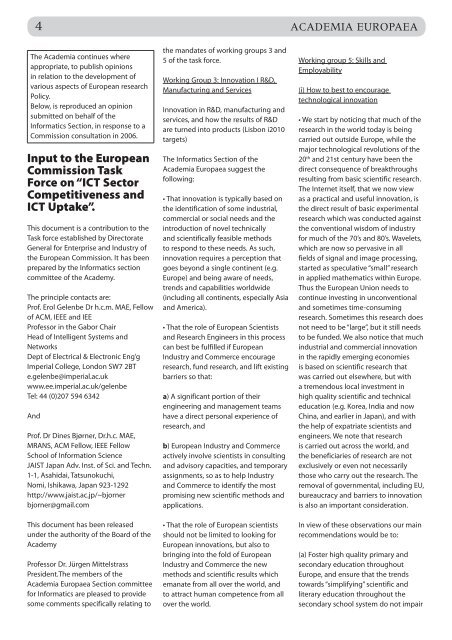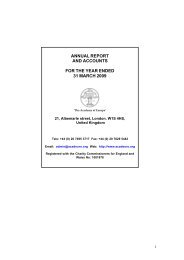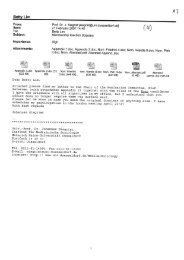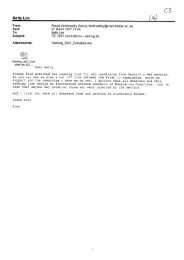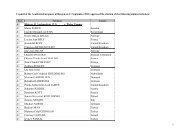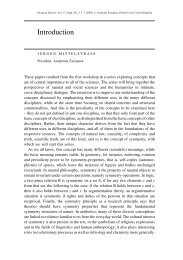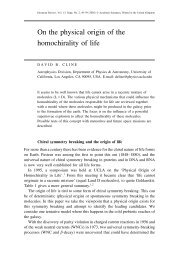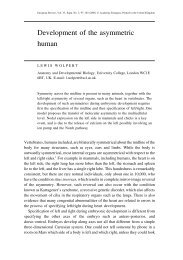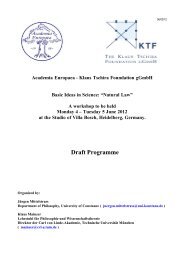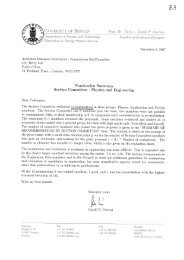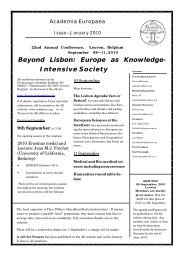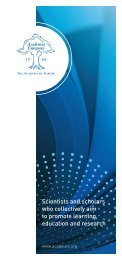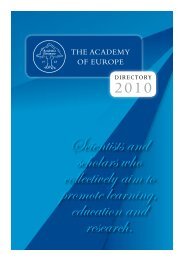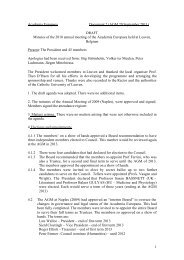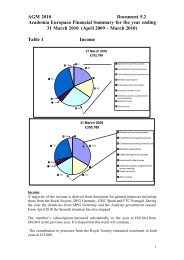You also want an ePaper? Increase the reach of your titles
YUMPU automatically turns print PDFs into web optimized ePapers that Google loves.
ACADEMIA EUROPAEA<br />
<strong>The</strong> <strong>Academia</strong> continues where<br />
appropriate, to publish opinions<br />
in relation to the development of<br />
various aspects of European research<br />
Policy.<br />
Below, is reproduced an opinion<br />
submitted on behalf of the<br />
Informatics Section, in response to a<br />
Commission consultation in 2006.<br />
Input to the European<br />
Commission Task<br />
Force on “ICT Sector<br />
Competitiveness and<br />
ICT Uptake”.<br />
This document is a contribution to the<br />
Task force established by Directorate<br />
General for Enterprise and Industry of<br />
the European Commission. It has been<br />
prepared by the Informatics section<br />
committee of the Academy.<br />
<strong>The</strong> principle contacts are:<br />
Prof. Erol Gelenbe Dr h.c.m. MAE, Fellow<br />
of ACM, IEEE and IEE<br />
Professor in the Gabor Chair<br />
Head of Intelligent Systems and<br />
Networks<br />
Dept of Electrical & Electronic Eng’g<br />
Imperial College, London SW7 2BT<br />
e.gelenbe@imperial.ac.uk<br />
www.ee.imperial.ac.uk/gelenbe<br />
Tel: 44 (0)207 594 6342<br />
And<br />
Prof. Dr Dines Bjørner, Dr.h.c. MAE,<br />
MRANS, ACM Fellow, IEEE Fellow<br />
School of Information Science<br />
JAIST Japan Adv. Inst. of Sci. and Techn.<br />
1-1, Asahidai, Tatsunokuchi,<br />
Nomi, Ishikawa, Japan 9<strong>23</strong>-1292<br />
http://www.jaist.ac.jp/~bjorner<br />
bjorner@gmail.com<br />
This document has been released<br />
under the authority of the Board of the<br />
Academy<br />
Professor Dr. Jürgen Mittelstrass<br />
President.<strong>The</strong> members of the<br />
<strong>Academia</strong> <strong>Europaea</strong> Section committee<br />
for Informatics are pleased to provide<br />
some comments specifically relating to<br />
the mandates of working groups 3 and<br />
5 of the task force.<br />
Working Group 3: Innovation I R&D,<br />
Manufacturing and Services<br />
Innovation in R&D, manufacturing and<br />
services, and how the results of R&D<br />
are turned into products (Lisbon i2010<br />
targets)<br />
<strong>The</strong> Informatics Section of the<br />
<strong>Academia</strong> <strong>Europaea</strong> suggest the<br />
following:<br />
• That innovation is typically based on<br />
the identification of some industrial,<br />
commercial or social needs and the<br />
introduction of novel technically<br />
and scientifically feasible methods<br />
to respond to these needs. As such,<br />
innovation requires a perception that<br />
goes beyond a single continent (e.g.<br />
Europe) and being aware of needs,<br />
trends and capabilities worldwide<br />
(including all continents, especially Asia<br />
and America).<br />
• That the role of European Scientists<br />
and Research Engineers in this process<br />
can best be fulfilled if European<br />
Industry and Commerce encourage<br />
research, fund research, and lift existing<br />
barriers so that:<br />
a) A significant portion of their<br />
engineering and management teams<br />
have a direct personal experience of<br />
research, and<br />
b) European Industry and Commerce<br />
actively involve scientists in consulting<br />
and advisory capacities, and temporary<br />
assignments, so as to help Industry<br />
and Commerce to identify the most<br />
promising new scientific methods and<br />
applications.<br />
• That the role of European scientists<br />
should not be limited to looking for<br />
European innovations, but also to<br />
bringing into the fold of European<br />
Industry and Commerce the new<br />
methods and scientific results which<br />
emanate from all over the world, and<br />
to attract human competence from all<br />
over the world.<br />
Working group 5: Skills and<br />
Employability<br />
(i) How to best to encourage<br />
technological innovation<br />
• We start by noticing that much of the<br />
research in the world today is being<br />
carried out outside Europe, while the<br />
major technological revolutions of the<br />
20 th and 21st century have been the<br />
direct consequence of breakthroughs<br />
resulting from basic scientific research.<br />
<strong>The</strong> Internet itself, that we now view<br />
as a practical and useful innovation, is<br />
the direct result of basic experimental<br />
research which was conducted against<br />
the conventional wisdom of industry<br />
for much of the 70’s and 80’s. Wavelets,<br />
which are now so pervasive in all<br />
fields of signal and image processing,<br />
started as speculative “small” research<br />
in applied mathematics within Europe.<br />
Thus the European Union needs to<br />
continue investing in unconventional<br />
and sometimes time-consuming<br />
research. Sometimes this research does<br />
not need to be “large”, but it still needs<br />
to be funded. We also notice that much<br />
industrial and commercial innovation<br />
in the rapidly emerging economies<br />
is based on scientific research that<br />
was carried out elsewhere, but with<br />
a tremendous local investment in<br />
high quality scientific and technical<br />
education (e.g. Korea, India and now<br />
China, and earlier in Japan), and with<br />
the help of expatriate scientists and<br />
engineers. We note that research<br />
is carried out across the world, and<br />
the beneficiaries of research are not<br />
exclusively or even not necessarily<br />
those who carry out the research. <strong>The</strong><br />
removal of governmental, including EU,<br />
bureaucracy and barriers to innovation<br />
is also an important consideration.<br />
In view of these observations our main<br />
recommendations would be to:<br />
(a) Foster high quality primary and<br />
secondary education throughout<br />
Europe, and ensure that the trends<br />
towards “simplifying” scientific and<br />
literary education throughout the<br />
secondary school system do not impair


